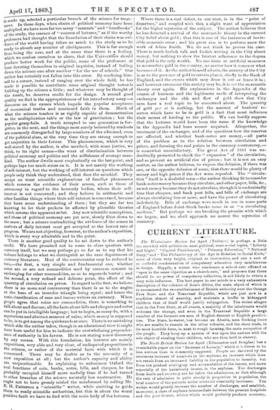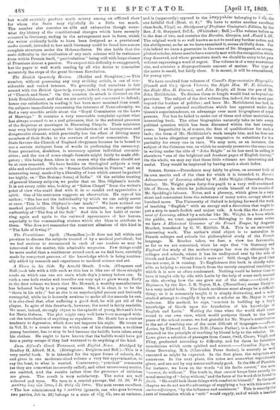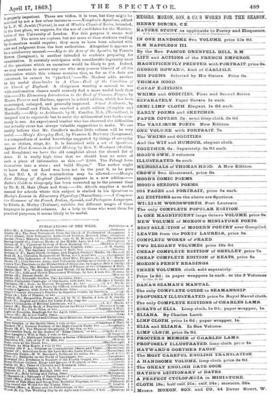CURRENT LITERATURE
—4--
The Westminster Review for April (Trlibner) is perhaps a little too crowded with articles on semi-political, semi-social topics, "Liberty and Light," "Capital Punishment," "Primary Education," "National Duty," and "The Philanthropy of the Age in Relation to Social Evils," none of thorn very bright, original, or instructive, and one a sort of ex cathedra condemnation of compulsory education very mischievous in design. Happily, a writer who condemns a school-rate offhand as "open to the same objection as a church-rate," and proposes that there should be no power of compulsory collection, is not likely to obtain a very wide influence. The best paper to our minds is a very exhaustive description of the colonies of South Africa, the main object of which is to recommend the re-establishment of British authority over the Orange Free State and the Transvaal Republic, which are just now in a condition almost of anarchy, and maintain a traffic in kidnapped children that of itself would justify subjugation. The writer alleges that in the Free State, at all events, a majority of the inhabitants would welcome the change, and even in the Transvaal Republic a large number of the farmers are men of English descent or English proclivities. The State, however, has become an Alsatia, men flocking there who are unable to remain in the other colonies, and the slave trade, in its most horrible form, is, next to rough farming, the main occupation of the people. They keep up a system of war upon the natives with the solo object of stealing their children, who are then held in slavery.
The North British Review for April (Edmonton and Douglas) has a remarkable paper on the "Increase of Lunacy," which it believes to be loss serious than is commonly supposed. People are deceived by the enormous increase of numbers in the asylums, an increase which does not result from an increased liability in the population to insanity, but from the gradual storing-up and accumulation of the insane, and more especially of the harmlessly insane, in the asylums. The discharges from death and recovery are far below the admissions, so that although the rate of admission is quite steady in proportion to population, the total number of the patients under restraint constantly increases. The writer would greatly increase the number of discharges, and establish, moreover, a class of asylums intermediate between the present hospitals and the poorhouses, advice which would probably produce economy,
but would certainly produce much misery among an afflicted class for whom the State may rightfully do a little too much. The number also contains an able and exhaustive though somewhat dry history of the constitutional changes which have recently occurred in Germany, ending in the arrangement now in force, which the writer evidently holds to have been designed as a provisional modes vivendi, intended to last until Germany could be fused into a more complete structure under the Hohenzollerns. He also holds that the main difficulty in the realization of any such scheme will be resistance from within Prussia itself, "particularism" being still with large classes of Prussians almost a passion. We suspect this difficulty is exaggerated, but the paper is well worth reading by all who desire to remember accurately the steps of the great German Revolution.
The British Quarterly Review. (Hodder and Stoughton.) — This number, without possessing any very striking article, is one of considerable and varied interest. We generally find ourselves in fair accord with the British Quarterly, except, indeed, on the groat question of " Church and State." On this occasion its attack is directed on the Irish Establishment, and that we are certainly not concerned to defend ; hence our satisfaction in reading it has been more unmixed than usual. On subjects immediately concerning the interests of Nonconformity, we find a very sensible article about the "Royal Commission on the Laws of Marriage." It contains a very reasonable complaint against what has always seemed to us a real grievance, that is the enforced presence of the Registrar at marriages in Dissenting Chapels. Their ministers may very fairly protest against the introduction of an incongruous and disagreeable element, which practically has the effect of driving many members of their flocks to the services of another communion. The State favours the Church of England clergyman because he is bound to use a certain stringent form of words in performing the ceremony. Some precaution, doubtless, is necessary against individual eccentricities; and the use of some simple formula might fairly be made obligatory ; this being done, tdere is no reason why the offence should not be at once removed. We have besides on theological subjects a very able and exhaustive article on " Roman Catholicism in France," and an interesting essay, marked by a liberality of tone which cannot be praised too highly, on '• The Brehm° Somaj of India." Of the articles treating of general literary subjects, we prefer that on Mrs. Oliphant's novels. It is not every critic who, looking at "Salem Chapel " from the writer's point of view who could deal with it in so candid and appreciative a spirit. One of his sentences suggests an observation. He says of his author; " Sho has not the individuality by which we can safely assert at once, This is Mrs. Oliphant's—her mark.' " We have noticed one marked peculiarity. It helped us, we remember, to recognize the authorship of "The Son of the Soil." And this is her habit of recurring again and again to tho outward appearances of her heroes, especially to the commanding stature which she likes to attribute to them. Who does not remember the constant allusions of this kind in "The Life of Irving ?"
The Practitioner. April. (Macmillan.)—It does not fall within our province to discuss the subjects 'treated of by a medical periodical; but we feel anxious to recommend to such of our readers as may be interested in the matter, this admirable magazine. Few things could be more useful than a continuous record such as we find here, carefully made by competent persons, of the knowledge which is being continually added by research and experience to medical science and art.
A Th9rn in his Side. By Arnold Heath. 3 vols. (Chapman and Hall.)—A tale with a title such as this has is like one of those straight roads on which one can see one's whole day's journey before ono. In such a case both reader and traveller are very apt to grow weary. Early in the first volume we learn that Mr. Howard, a wealthy manufacturer, has behaved badly to a young woman. She, it is clear, is to be the "thorn in his side ;" but as she is an unprincipled person and furiously revengeful, while ho is honestly anxious to make all the amends ho can, it is also clear that, after suffering a good deal, ho will get rid of the plague. In spite of this drawback, however, the novel is fairly readable. We must, indeed, strongly object to the episode of young Howard's love for Maria Dobson. The plot might very well have been managed without the introduction of anything so repulsive. Mr. Heath has a curious tendency to digression, which does net improve his style. He treats us in Vol. II. to a comic scene in which one of his characters, a reckless young barrister, has to stop in bed because the bailiffs have taken away his clothes. He ought to have known that the bailiffs would have got into a pretty scrape if they bad ventured to do anything of the kind.
Dean Alford's Greek Testament, with English Notes. Abridged by Bradley H. Alford, M.A. (Rivingtons ; Delight= and Bell.)—This is a very useful book. It is intended for the upper forms of schools, &c., and gives in ono moderate-sized volume a very fair approximation, to say the least, to what is wanted. Controversy, "practical" comments (as they are somewhat incorrectly called), and other unnecessary matter, are omitted, and the results rather than the processes of criticism
are given. The result is very satisfactory. The notes are well selected and terse. We turn to a crucial passage, Gal. iii. 20, .0 di -410117; Eyes aiat la'rrs, 6 di 0E4 eh ierrv. The note seems excellent. " The law administered by d ,tarerkr,; (generic, one who goes between two parties, Job ix. 33) belongs to a state of aLy„, Eh, two at variance, and is (apparently) opposed to the i'roxya'aktr belonging to O Eh, the one faithful God (Dent. vi. 4)." We have to notice another excellent class-book, Virgil, an Abridgment of Professor Conington's Edition, by the Rev. J. G. Sheppard, D.C.L. (Whittaker ; Bell.)—The volume before us. is the first of two, and contains the Bucolic:, Georgics, and JEneiel
The original work is so well known as not to need any further notice, and the abridgment, as far as we have examined it, seems skilfully done. For this indeed we have a guarantee in the name of Dr. Sheppard, an accom. plished scholar, whose merits have scarcely met with the recognition which they deserved, and whose premature death we should bo sorry to let pass without expressing a word of regret. The volume is of a very convenient size, and contains a disproportionate amount of matter. The type of the notes is small, but fairly clear. It is meant, it will be remembered, for young eyes.
We have received four volumes of Cassell's Representative Biographies (Cassell and Co.), Queen Victoria, the Right Hon. W. E. Gladstone, the Right Hon. B. Disraeli, and John Bright, all from the pen of Mr. .John MeGilchrist. To discuss them at length would lead us beyond our province. The subject of the first volume lies, indeed, for the most parr beyond the borders of politics ; and here Mr. McGilchrist has had, in the volume of personal recollections which has appeared under the Queen's superintendence, an advantage over most biographers of royal persons. Nor has he failed to make out of these and other materials an interesting book. The other biographies naturally take us into every political question which has been discussed within the last twenty years. Impartiality is, of course, the first of qualifications for such a task ; the form of Mr. McGilehrist's work tempts him, and he does not seam to have altogether escaped the temptation to substitute for it a partiality for every one in turn. We may note, as an instance, the subject of the Crimean war, on which he scarcely preserves the same tone in writing under the title of "John Bright" as he has used in calling it elsewhere " one of the brightest and freshest pages of English history." On the whole, we may say that these little volumes are interesting and useful. They would be improved by having each a short index.
Scuoot. Booses.—Precedence may fairly be given, on account both of its own merits and of the class for which it is intended, to Bacon's Advancement of Learning, edited by W. Aldis Wright (Clarendon Press Series). Mr. Wright gives forty-five pageb to a very well-condensed life of Bacon, in which he judiciously avails himself of the results of Mr. Spedding's labours. Notes, and a glossary, which gives in a very short and convenient form the substance of many notes, occupy about a hundred more. The University of Oxford is helping forward the work of teaching " English " with an energy and a discretion that ought to put a stop to much foolish and unjust talk. A book like the Advancement of Learning, edited by a scholar like Mr. Wright, is a boon which the public, we trust, appreciates. —Belonging to the same series wo have A Historical Grammar of the French Dque, by Auguste Brachet, translated by G. W. Kitchin, M.A. This is an extremely interesting work. The author's chief object is to naturalize in French colleges and schools the philosophical study of the French language. M. Brachet takes, wo fear, a view too favourable, as far as we are concerned, when he says that "in Germany and England the study of the mother-tongue has won its citizenship in colleges and schools, where it has its undisputed seat by the side of Greek and Latin." Would that it were so! Still, though the good time has not come, it is coming. To Englishmen this book is chiefly valuable, as helping to rescue French from the merely empirical teaching to which it is now so often condemned. Nothing could be better than to have it taught side by aide with Latin by the help of some such manual as this, showing how the one grew out of the other.—Greek for Beginners, by the Rev. J. B. Mayor, M.A. (Macmillan), seems likely to be a very useful book. The Greek accidence must always be a difficult thing; as it is commonly taught it is simply distracting, and a wellstudied attempt to simplify it by such a scholar as Mr. Mayor is very welcome. His method, ho says, "consists in building up a koy's knowledge of Greek upon the foundation of his knowledge of English and Latin." Waiting the time when the world shall come round to our own view, which would postpone Greek to the later years of the school course, wo feel grateful for Mr. Mayor's contribution to the art of teaching one of the most difficult of lauguages.--Pada Latina, by Edward C. Lowe, D.D. (James Parker), is a class-book cora structed on the principle of teaching by liberal help to the scholar. Dr• Lowe gives a selection of passages from Ctosar, Ovid, Cicero, Virgil, and Pliny, graduated according to difficulty, and for these he furnishes translations which seem spirited and correct.—Cornelius Neps, by Oscar Browning, U.A. (Clarendon Press Series), is scarcely as well executed as might bo expected. In the first place, the misprints are numerous. In the next place, the notes are somewhat capriciously given, and are not by any means uniformly good. In the life of Phocion, for instance, wo have on the words "si his facile careret," the note "careret, do without." The truth is, that careret keeps here exactly its usual meaning of "being without," and the force of the word do is found in facile. "Ho could lack these things with comfort to himself." In the no chapter we do net see the advantage of supplying a boy with this note on auctus adjutasque, "by the influence and assistance." This is exactly the sort of translation which a "crib" would supply, and of which a teacher is properly impatient. These are friths, it is true, but they might be matched by not a few other instances.—Xenoplion's Agesilaus, edited by L. F. W. Jewitt (Virtue), is one of Weak's Classic rl Series, intended, in the first place, we suppose, for the use of candidates for tho Matriculation of the University of London. For this purpose it seems well adapted. The notes are copious, but not more so than students reading by themselves would require; they seem to have boon selected with care and judgment from the best authorities. Altogether it appears to be a satisfactory manual.—Key to the Acts of the Apostles, by Francis Besot (Longman), is another intended to students preparing for examination. It certainly anticipates with considerable ingenuity most of the questions which an examiner would be likely to put. Indeed, we may venture to assure any one who may possess himself of all the information which this volume contains that, as far as the Acta aro concerned, he cannot be "plucked."—Mr. Maclear adds another to his useful class-books in A Class Book of the Catechism (gr the Church of England. A clergymen wanting a manual to use with confirmation classes could scarcely find a more useful book than this.—The Elementary Introduction to the Book of Common Prayer, by Messrs. Procter and Maclear, appears in a third edition, which has been re-arranged, enlarged, and generally improved. S hoof Arithmetic, by Messrs. Cornell and Fitch, has reached a ninth edition (Simpkiu and Marshall).—help to Arithmetic, by H. Candler, M.A. (Macmillan), is designed not to supersede but to assist the arithmetical text-books commonly in use. An experienced teacher who has observed the difficulties that actually occur has always valuable suggestions to make. We can readily believe that Mr. Candler's modest little volume will be very useful.-11.Thry's Everyday Book, by Frances E. Burbury (Longmans), is a compendium of useful knowledge suggested by things of everyday use, as clothes, rings, &c. It is furnished with a set of Questions. Against First Lessons in Ancient History, by Rov. T. Woolmer (Hodder, and Stoughton) we have the old complaint about the absurd list of dates. It is really high time that wo should hear no more of such a piece of information as this :—" 2,000. The Polasgi form themselves into a state ; and build Sicyon." The author ought to know that our Lord was born not in the year 0, as he puts it, but B.C. 4, if the contradiction may be allowed.—Henry's First History of England (Lawrie) appears in a now edition. Butler's Guide to Geography has been corrected up to the present time by Mr. It. H. Mark (Doan and Son).—Dr. Alcock supplies a useful manual for schools where this subject is studied in his Questions on Huxley's Lessons in Elementary Physiology (Macmillan).—A Comparative Grammar of the French, Italian, Spanish, and Portuguese Languages, by Edwin A. Motley (Triibner), exhibits the different usages of those languages in parallel columns. As a help to those who want them for practical purposes, it seems likely to be usefuL




































 Previous page
Previous page